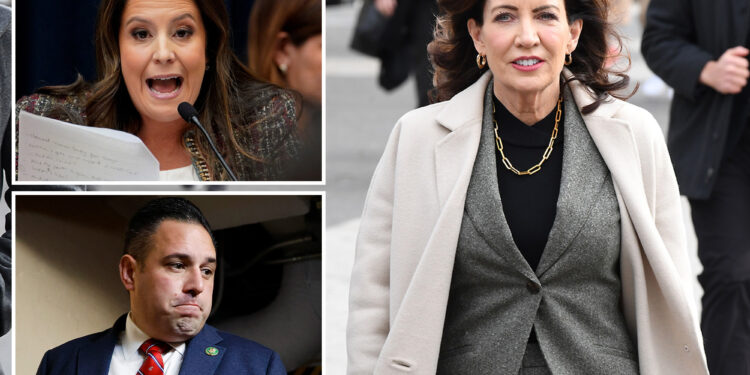
New York GOP Reps. Anthony D’Esposito and Elise Stefanik introduced a resolution Wednesday rebuking Democratic Gov. Kathy Hochul over the Empire State’s so-called Clean Slate Act.
Hochul signed the measure last month, sealing certain misdemeanor records after three years and some felony records after eight years following the completion of a prison sentence — as long as the offender doesn’t commit another crime during that time.
“Governor Kathy Hochul is once again placing the priorities of criminals ahead of law-abiding New Yorkers and our community’s law enforcement professionals,” said retired NYPD detective D’Esposito, who represents part of Nassau County, said in a statement.
“Once again Kathy Hochul is prioritizing violent criminals over victims and our men and women in Blue,” added Stefanik, the House GOP conference chair.
All 10 House Republicans from New York have signed on to the resolution.
Under the Clean Slate Act, which will take effect Nov. 16, 2024, charges eligible for sealing include disorderly conduct, larceny and vandalism as well as non-violent felonies like money laundering, insurance fraud and compelling prostitution.
So-called “class A felonies” like murder, predatory sexual assault, terrorism, arson and kidnapping would not be eligible for sealing — apart from drug possession.
Law enforcement and courts will continue to have full access to records, as would any employer that can currently conduct fingerprinting as part of a job application — including schools and day cares.
“The Clean Slate Act will handcuff employers and landlords by preventing comprehensive background checks from being conducted on potential employees and tenants, thereby endangering everyday New Yorkers who may be unintentionally placing themselves in harm’s way thanks to the Governor’s misguided plan,” D’Esposito explained.
“Kathy Hochul’s disastrous, pro-crime Clean Slate Act will prohibit New Yorkers from conducting comprehensive background checks on potential employees or tenants, further endangering the lives of all our constituents,” Stefanik contended.
Hochul defended the policy as means of helping the economy and granting New Yorkers a second chance.
“The best crime-fighting tool is a good-paying job,” she said at the time. “That’s why I support giving New Yorkers a clean slate after they’ve paid their debt to society and gone years without an additional offense,”

























